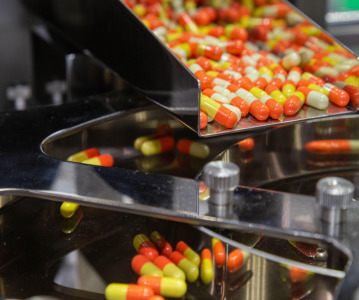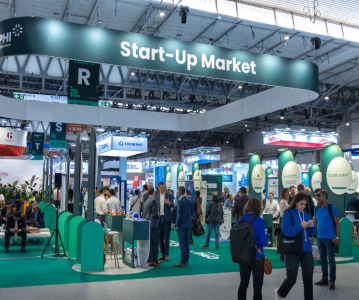Pharmapack expert recommends holistic approach to sustainability
.jpg)
Although the industry might be 30% along its sustainability journey, greater interoperability is needed from materials to devices.
In an in-depth review of the market and having evaluated the collective developments from this year’s Pharmapack event, Gregor Anderson, MD of Pharmacentric Solutions, offers a positive appraisal of pharma’s drive towards sustainability, as well as identifying areas requiring further improvement.
“I am really encouraged by the massive strides we have made this year. As an industry, we are no longer paying lip service to sustainability and wherein once there might have just been a single dedicated employee, there are now entire teams looking at improving methods and exploring lifecycle impact,” commented Anderson.
A significant difference is the increased sharing across the industry and the active involvement of the entire supply chain in the discussion. Even Big Pharma is presenting data and case studies on how they have implemented improvements. In addition, packaging and device suppliers are working more closely with Big Pharma, which is leading to accelerated development.
Anderson notes that for the industry to truly meet sustainability goals it will need to stop applying bespoke solutions company by company. Instead, material suppliers should enter the debate and work across the industry with Big Pharma and device and packaging suppliers.
This approach will deliver the economies of scale needed to incentivize the development of more environmentally sustainable materials. The standardised use of materials industry-wide could make a massive improvement to current options. The industry also needs to extend this to recycling networks.
Exploring patient behaviour and their reaction to innovations is another area for improvement; for example, reducing the misuse of medicines. Approximately 50% of medicines are not correctly used by patients, ultimately leading to their waste or unnecessary alternatives then being prescribed. “Anything the industry can do to improve adherence will automatically increase sustainability,” said Anderson.
Despite the wider issues currently affecting society, Anderson urges the industry to keep up the momentum and to continue to "promote the great sustainability strides the industry has made in the last year".
Related News
-
News Pharmapack Awards 2024 Patient-Centric Design Award Winner – Dr Ferrer BioPharma
The 2024 Pharmapack Awards celebrated the best in innovation and design for the pharmaceutical packaging and drug delivery industry on January 24, 2024. -
News Women in Pharma: Minding the Gap at Pharmapack 2024
2024 marks the first year Pharmapack will host a Diversity track dedicated to bridging the gap within the pharmaceutical packaging and drug delivery sector. The track includes a panel discussion on 'Enabling Diversity in the Workplace,' focused... -
News Pharmapack Awards 2024 - Celebrating Packaging and Drug Delivery Innovation
The 2024 Pharmapack Innovation Awards ceremony celebrated the best in pharmaceutical packaging and drug delivery innovation at all levels. The awards were held on January 24, 2024 at the Paris Expo Porte de Versailles. -
News Pharmapack 2024 - From the Floor
Paris once again welcomes Europe’s leading trade show in pharmaceutical packaging and drug delivery innovation. Join our content team as Pharmapack 2024 opens its doors to leading experts and innovators in pharmaceutical packaging and drug delive... -
News CPHI Barcelona 2023: Partnering for Success – Managing Outsourcing Relationships to Optimise Manufacturing Operations
During CPHI Barcelona 2023, insightful content sessions offered attendees the chance to explore trending topics with expert speakers and panellists. Here, we summarise what the pharma industry and supply chain are talking about the most. -
News CPHI Barcelona 2023: Loading Potential – Artificial Intelligence for Pharma Manufacturing
During CPHI Barcelona 2023, insightful content sessions offered attendees the chance to explore trending topics with expert speakers and panellists. Here, we summarise what the pharma industry and supply chain are talking about the most. -
News Pharmaceutical industry supports COP28 health stance in joint statement
As COP28 takes place over this week in Dubai, UAE, several bodies in the pharmaceutical and health industries have come together to announce support of key movements in sustainability in the sector, and to recognise sustainability as a health issue.&nb... -
News CPHI Podcast Series: Start-ups take centre stage at CPHI Barcelona
The first episode of the CPHI Podcast Series since we attended CPHI Barcelona in October covers the Start-up market at the event, with expert Matthew Wise joining Editor Lucy Chard to discuss the event.
Position your company at the heart of the global Pharma industry with a CPHI Online membership
-
Your products and solutions visible to thousands of visitors within the largest Pharma marketplace
-
Generate high-quality, engaged leads for your business, all year round
-
Promote your business as the industry’s thought-leader by hosting your reports, brochures and videos within your profile
-
Your company’s profile boosted at all participating CPHI events
-
An easy-to-use platform with a detailed dashboard showing your leads and performance





.png)

